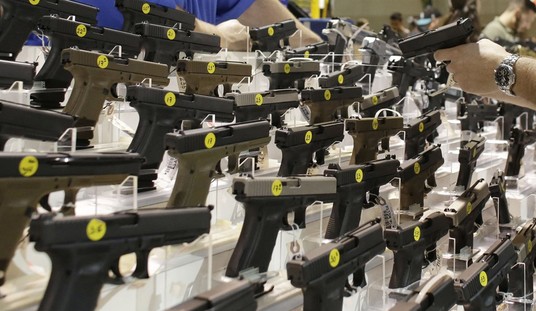In a hugely important decision, an en banc panel of the Third Circuit Court of Appeals has ruled that a Pennsylvania man who pled guilty to a single count of making a false statement in order to receive food stamps nearly 30 years ago should not be prohibited under federal law from purchasing or possessing a firearm.
Bryan Range pleaded guilty to a misdemeanor charge, not a felony, but because the crime was punishable by up to five years in state prison he was still subjected to the federal prohibition on gun ownership for those “convicted in any court, of a crime punishable by imprisonment for a term exceeding one year.”
In 2020, more than two decades after his guilty plea, Range filed a federal lawsuit in U.S. District Court in Allentown, Pennsylvania with the support of the Firearms Policy Coalition arguing that his Second Amendment rights had been violated. While that court upheld Range’s prohibition, today the Third Circuit reversed that decision and granted Range the relief he’s been after for years. In its decision, the panel (which includes two judges appointed by Joe Biden) ruled that Range was still a part of “the people” who possess the right to keep and bear arms regardless of his decades-old misdemeanor.
The Government contends that the Second Amendment does not apply to Range at all because “[t]he right to bear arms has historically extended to the political community of lawabiding, responsible citizens.” So Range’s 1995 conviction, the Government insists, removed him from “the people” protected by the Second Amendment.
The Supreme Court referred to “law-abiding citizens” in Heller. In response to Justice Stevens’s dissent, which relied on United States v. Miller, , the Court reasoned that “the Second Amendment does not protect those weapons not typically possessed by law-abiding citizens for lawful purposes.” In isolation, this language seems to support the Government’s argument. But Heller said more; it explained that “the people” as used throughout the Constitution “unambiguously refers to all members of the political community, not an unspecified subset.” So the Second Amendment right, Heller said, presumptively “belongs to all Americans.” Range cites these statements to argue that “law-abiding citizens” should not be read “as rejecting Heller’s interpretation of ‘the people.’” We agree with Range for four reasons.
First, the criminal histories of the plaintiffs in Heller, McDonald, and Bruen were not at issue in those cases. So their references to “law-abiding, responsible citizens” were dicta. And while we heed that phrase, we are careful not to overread it as we and other circuits did with Heller’s statement that the District of Columbia firearm law would fail under any form of heightened scrutiny.
Second, other Constitutional provisions reference “the people.” It mentions “the people” twice with respect to voting for Congress, and “the people” are recognized as having rights to assemble peaceably, to petition the government for redress, and to be protected against unreasonable searches and seizures. Unless the meaning of the phrase “the people” varies from provision to provision—and the Supreme Court in Heller suggested it does not—to conclude that Range is not among “the people” for Second Amendment purposes would exclude him from those rights as well. And we see no reason to adopt an inconsistent reading of “the people.”
Third, as the plurality stated in Binderup: “That individuals with Second Amendment rights may nonetheless be denied possession of a firearm is hardly illogical.” That statement tracks then-Judge Barrett’s dissenting opinion in Kanter v. Barr, in which she persuasively explained that “all people have the right to keep and bear arms,” though the legislature may constitutionally “strip certain groups of that right.” We agree with that statement in Binderup and then-Judge Barrett’s reasoning.
Fourth, the phrase “law-abiding, responsible citizens” is as expansive as it is vague. Who are “law-abiding” citizens in this context? Does it exclude those who have committed summary offenses or petty misdemeanors, which typically result in a ticket and a small fine? No. We are confident that the Supreme Court’s references to “law-abiding, responsible citizens” do not mean that every American who gets a traffic ticket is no longer among “the people” protected by the Second Amendment. Perhaps, then, the category refers only to those who commit “real crimes” like felonies or felony-equivalents? At English common law, felonies were so serious they were punishable by estate forfeiture and even death. But today, felonies include a wide swath of crimes, some of which seem minor. And some misdemeanors seem serious. As the Supreme Court noted recently: “a felon is not always more dangerous than a misdemeanant.” (cleaned up). As for the modifier “responsible,” it serves only to undermine the Government’s argument because it renders the category hopelessly vague. In our Republic of over 330 million people, Americans have widely divergent ideas about what is required for one to be considered a “responsible” citizen.
Having determined that Range is a part of “the people” who possess the right to keep and bear arms, the Third Circuit then looked at whether or not the federal statute regarding prohibited persons, at least as it applies to Range’s case, is “part of the historical tradition that delimits the outer bounds of the right to keep and bear arms.”
According to the court, it’s not. While the DOJ pointed to the 1938 Federal Firearms Act and the 1961 statute barring those convicted of a crime that can result in more than one year’s imprisonment as longstanding and presumptivelyv lawful, the Third Circuit found instead that:
Even if the 1938 Act were “longstanding” enough to warrant Heller’s assurance—a dubious proposition given the Bruen Court’s emphasis on Founding- and Reconstruction-era sources, Range would not have been a prohibited person under that law. Whatever timeframe the Supreme Court might establish in a future case, we are confident that a law passed in 1961—some 170 years after the Second Amendment’s ratification and nearly a century after the Fourteenth Amendment’s ratification—falls well short of “longstanding” for purposes of demarcating the scope of a constitutional right. So the 1961 iteration of § 922(g)(1) does not satisfy the Government’s burden.
Similarly, the government’s argument that “legislatures traditionally used status-based restrictions” didn’t fare well with the Third Circuit, which noted that “Apart from the fact that those restrictions based on race and religion now would be unconstitutional under the First and Fourteenth Amendments, the Government does not successfully analogize those groups to Range and his individual circumstances. That Founding-era governments disarmed groups they distrusted like Loyalists, Native Americans, Quakers, Catholics, and Blacks does nothing to prove that Range is part of a similar group today. And any such analogy would be “far too broad.”
While the Third Circuit’s decision applies solely to Range and not all those in similar circumstances, its still a very important decision because it’s the first full appellate court to demolish the DOJ’s assertion that the the right to keep and bear arms applies solely to “law-abiding citizens” and not we the people as a whole. With the Supreme Court already set to consider another case along those same lines in conference later this month, today’s opinion in Range v. Garland is a much-welcomed addition to current case law, and one that appears to treat the Second Amendment as a first-class right no different than any other belonging to we the people.









Join the conversation as a VIP Member